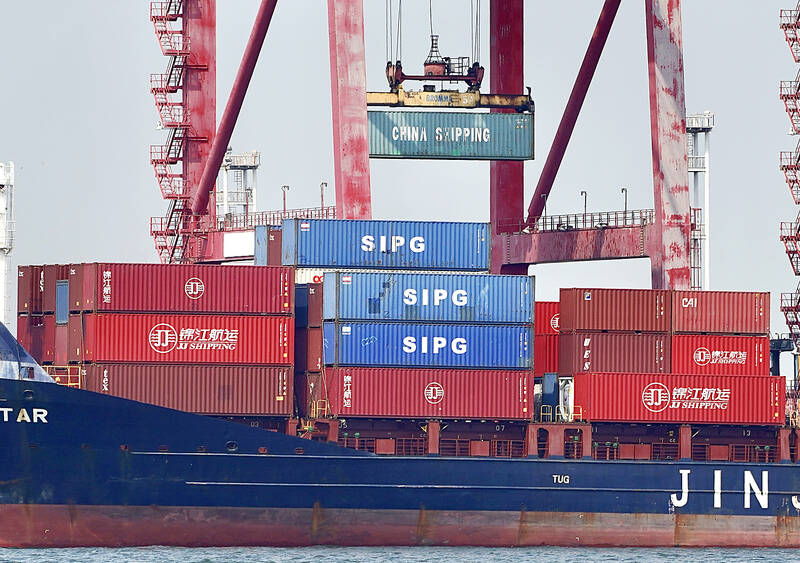Export orders last month contracted by a slower-than-expected 3 percent year-on-year as demand for artificial intelligence (AI) and high-performance computing (HPC) applications helped absorb a seasonal slowdown, the Ministry of Economic Affairs said yesterday.
Orders last month slid to US$46.97 billion from US$48.42 billion in January last year. The ministry had predicted orders would shrink at least 4 percent from a year earlier.
On a monthly basis, orders fell 11.2 percent from US$46.97 billion, ministry data showed.

Photo: CNA
“As strong AI and HPC applications continued to drive demand for electronics orders last month on an annual basis, the AI boom is not cooling down,” Department of Statistics Director Huang Yu-ling (黃于玲) said.
In addition, the ministry’s survey found that fewer firms were requested to ship goods ahead of schedule last month compared with the previous month as their customers seemed to be less worried about upcoming US tariffs, Huang said.
Export orders this month are expected to return to annual growth of between 15.3 percent and 20.6 percent to between US$43.5 billion and US$45.5 billion, the ministry said.
“We still expect an uptrend in the short term, though there are multiple uncertainties ahead in terms of geopolitical risks,” Huang said. “Export orders in January and February combined are expected to show year-on-year growth of between 5 and 7.3 percent.
Orders for electronic products last year increased 1.5 percent year-on-year to US$17.71 billion due to strong AI and HPC demand, despite declines in orders for chip designers and substrates, while orders for information and communications technology products dipped 13.3 percent to US$12.06 billion as demand for mobile phones and laptops dropped over the Lunar New Year holiday, the ministry said.
Orders for optoelectronic products edged 0.3 percent lower to US$1.58 billion last month, due to slower seasonal demand for back-light modules and camera lenses, the ministry said.
Orders for base metals plunged 21.7 percent to US$1.78 billion because of weak steel demand and price competition, while orders for machinery products and mechanical equipment dropped 4.7 percent to US$1.53 billion on sagging automation demand, it said.
Orders for plastic and rubber products sank 20.5 percent to US$1.32 billion as customers preordered ahead of the Lunar New Year holiday, while orders for chemical products contracted 19 percent to US$1.22 billion due to intensifying competition from global peers, the ministry said.

Intel Corp chief executive officer Lip-Bu Tan (陳立武) is expected to meet with Taiwanese suppliers next month in conjunction with the opening of the Computex Taipei trade show, supply chain sources said on Monday. The visit, the first for Tan to Taiwan since assuming his new post last month, would be aimed at enhancing Intel’s ties with suppliers in Taiwan as he attempts to help turn around the struggling US chipmaker, the sources said. Tan is to hold a banquet to celebrate Intel’s 40-year presence in Taiwan before Computex opens on May 20 and invite dozens of Taiwanese suppliers to exchange views

Application-specific integrated circuit designer Faraday Technology Corp (智原) yesterday said that although revenue this quarter would decline 30 percent from last quarter, it retained its full-year forecast of revenue growth of 100 percent. The company attributed the quarterly drop to a slowdown in customers’ production of chips using Faraday’s advanced packaging technology. The company is still confident about its revenue growth this year, given its strong “design-win” — or the projects it won to help customers design their chips, Faraday president Steve Wang (王國雍) told an online earnings conference. “The design-win this year is better than we expected. We believe we will win

Chizuko Kimura has become the first female sushi chef in the world to win a Michelin star, fulfilling a promise she made to her dying husband to continue his legacy. The 54-year-old Japanese chef regained the Michelin star her late husband, Shunei Kimura, won three years ago for their Sushi Shunei restaurant in Paris. For Shunei Kimura, the star was a dream come true. However, the joy was short-lived. He died from cancer just three months later in June 2022. He was 65. The following year, the restaurant in the heart of Montmartre lost its star rating. Chizuko Kimura insisted that the new star is still down

While China’s leaders use their economic and political might to fight US President Donald Trump’s trade war “to the end,” its army of social media soldiers are embarking on a more humorous campaign online. Trump’s tariff blitz has seen Washington and Beijing impose eye-watering duties on imports from the other, fanning a standoff between the economic superpowers that has sparked global recession fears and sent markets into a tailspin. Trump says his policy is a response to years of being “ripped off” by other countries and aims to bring manufacturing to the US, forcing companies to employ US workers. However, China’s online warriors